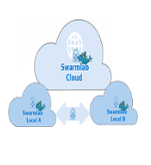 # Swarmlab Venus
### **Welcome to Swarmlab.io**
# Swarmlab Venus
### **Welcome to Swarmlab.io**
## Swarmlab-venus Network Virtualization
### on-demand network environments
### private - public - hybrid
# on-demand sandbox environments
* Virtual Labroom
* Virtual Classroom
* Proof-of-Concept (POC)
### Table of contents
2. [System requirements ](#systemrequirements)
3. [Prerequisites](#prerequisites)
4. [Installation](#installation)
## System requirements
**Before** you create and configure a hybrid deployment using the swarmlab-agent client, your Local Machines need to meet certain requirements.
> If you don't meet those requirements, you won't be able to complete the steps within the swarmlab-agent client and you won't be able to configure a network deployment between your Local Enviroment and Swarmlab Online Enviroment.
- A Linux Server (Virtual or Physical)
- You must have super user privileges (root/sudo)
- Docker Engine- Community version 18 or later is required.
- Docker Engine is supported on x86_64 (or amd64), armhf, and arm64 architectures.
- RAM
- Absolute minimum to run the daemon and some very light containers - 512MB
- Minimum for “comfortable” usage – 2GB
- CPU
- Minimum: 2
- Recommended 4+
- Disk Space
- 10 GB for internal requirements.
- The amount of additional disk space soloemnly depends on you intended use.
:warning: Since Docker uses hypervisor the host NEEDS TO HAVE VIRTUALIZATION ENABLED!
## Prerequisites
* node version >15
[Install Node](http://docs.swarmlab.io/SwarmLab-HowTos/labs/Howtos/nodejs/install-nodejs.adoc.html)
or run
```sh
curl -sL https://deb.nodesource.com/setup_15.x | sudo -E bash -
sudo apt-get install -y nodejs
```
* docker
[install docker](http://docs.swarmlab.io/SwarmLab-HowTos/labs/Howtos/docker/install-docker.adoc.html)
or run
```sh
curl -fsSL https://download.docker.com/linux/ubuntu/gpg | sudo apt-key add -
sudo add-apt-repository "deb [arch=amd64] https://download.docker.com/linux/ubuntu $(lsb_release -cs) stable"
sudo apt update
sudo apt install -y docker-ce
sudo usermod -aG docker $USER # Please replace $USER with the user you want to run docker on
```
:information_source: for kali specifically please visit the following link to install docker.
https://linuxhint.com/install_docker_kali_linux/
* docker-compose
```sh
sudo curl -L "https://github.com/docker/compose/releases/download/1.27.4/docker-compose-$(uname -s)-$(uname -m)" -o /usr/local/bin/docker-compose
sudo chmod +x /usr/local/bin/docker-compose
sudo ln -s /usr/local/bin/docker-compose /usr/bin/docker-compose
```
* pm2
```sh
sudo npm install -g pm2
```
* wireguard
[Install Wireguard](http://docs.swarmlab.io/SwarmLab-HowTos/labs/Howtos/wg/install-wg.adoc.html)
or run
```sh
sudo apt install wireguard jq
```
## Installation
### for *nix
- Clone the repo
```sh
git clone --recurse-submodules https://git.swarmlab.io:3000/swarmlab/venus-client.git
```
- Install it!
```sh
cd venus-client
./install.sh <-- run it without root privileges
```
- Open URL __http://localhost:8085/index.html__ in browser
- Get a Swarmlab account.
### for windows or if you wish to keep the environment contained
You can find ready to run VM images here.
And instructions on how to use them here.
:information_source: Default password: swarmlab
PLEASE CHANGE PASSWORD IMEDIATELLY AFTER FIRST LAUNCH!!!
 # Swarmlab Venus
### **Welcome to Swarmlab.io**
# Swarmlab Venus
### **Welcome to Swarmlab.io**